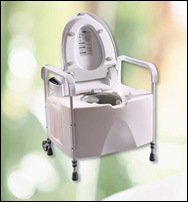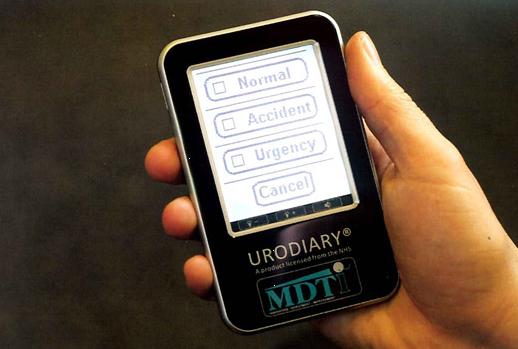Devices for Dignity (D4D) is one of two Healthcare Technology Co-operatives (HTCs) set up as a results of a Health Industry Task Force report published in 2005, which advised the Government of the need to provide a more structured environment for innovation.
We look for unmet clinical needs and then provide the help and support necessary to bring those products and solutions to market
D4D was launched in 2008 and concentrates specifically on three key areas historically under resourced and under developed - assistive technologies, urinary continence management and renal solutions. The organisation is supported by the National Institute for Health Research, the Engineering and Physical Sciences Research Council, and the Medical Research Council, with additional backing from the Department of Health. D4D is hosted by Sheffield Teaching Hospitals NHS Foundation Trust and provides a one-stop-shop where healthcare professionals, clinicians, inventors, academic institutions, patients, carers and industry leaders can use their combined expertise to develop effective solutions that enhance the lives of patients and their carers.
The three focus areas are unglamorous and therefore often overlooked by research funding, but they are areas where we can make a major impact on people's quality of life, dignity and independence
As a result of this joined-up approach, the initiative aims to help overcome a common hurdle experienced by medical device manufacturers, namely getting their products acknowledged and potentially adopted by NHS purchasers.
So far, one piece of equipment - the Dignity Bidet Commode – has made it to market, two more are close to market, more than 30 other projects are in various stages of development, and more are coming in through the D4D online checklist process on a weekly basis.
In an interview with HES this week, Chris Harris, commercial director at D4D, said the team looks for ideas that address unmet needs. He added: "A lot of devices are designed and pushed through the NHS even though no one has thought to see if they actually address the needs of the patient and the service. We are essentially reversing that trend and asking key users and professionals exactly what they need before it is manufactured. We look for unmet clinical needs and then provide the help and support necessary to bring those products and solutions to market.
"The three focus areas are unglamorous and therefore often overlooked by research funding, but they are areas where we can make a major impact on people's quality of life, dignity and independence."
D4D puts each idea though a rigorous series of tests of due diligence to see if it addresses a need, if it is scalable and if it provides significant user impact or cost savings to the service to be rolled out across the wider NHS.
Our aim is to provide the support to take innovations to the point where we can say 'we know the patient needs this, the clinicians endorse this, and the NHS would benefit from this and therefore there is a market and we can help you'
Harris said: "We provide access to expert networks, health economics, user-centred design, including design and clinician and user groups. If the idea meets our remit and is sanctioned by our team of experts, we then arrange to meet the inventor to explore the potential of developing the concept, a future collaborative effort and inclusion onto the D4D portfolio of projects. They then either pay D4D for this service, or if we consider the innovation will have a major impact, we then look at other funding avenues such as the D4D Proof of Concept funds, grant applications, internal clinical support etc, particularly if the concept has major user impact of where it can bring about savings for the NHS.
"Our aim is to provide the support to take innovations to the point where we can say 'we know the patient needs this, the clinicians endorse this, and the NHS would benefit from this and therefore there is a market and we can help you'.
A lot of devices are designed and pushed through the NHS even though no one has thought to see if they actually address the needs of the patient and the service
"We look at each concept and put them in front of key opinion leaders or patient focus groups so the developers can present a robust case to purchasers, which historically is very difficult in the NHS. We can't say we can open the door to procurement within the NHS, but we are trying to develop a 'kitemark' of sorts that says if you are engaged with D4D is does add significantly to the innovation and may break down some of the barriers. The purchasers can see the product has been evaluated by a Department of Health-funded programme and that gives it a certain degree of credibility."
As well as the involvement of the Sheffield trust, the project also has collaborative agreements with six NHS trusts in England and three major universities, providing an opportunity for on-site clinical and academic evaluation; another feather in the cap for manufacturers wanting to get products into the health service supply chain.
Harris said: "We have been really pleased with the traction of the programme. We are regularly getting three or four checklists through a week from innovators who have identified unmet needs or have concepts to address an unmet need. Some do not meet our remit and are turned away, but at the moment we are running more than 30 projects.
"Our collaborative approach works in a unique way and we aspire to reach the stage where we become the access point of choice for companies to approach the NHS."
In addition to those products going through the early stages of evaluation and development, three are in the advanced stages. Under the heading of renal technologies, D4D is working on a unique haemodialysis machine - the SelfCare+ - which has won the endorsement of NHS chief executive, Sir David Nicholson. Developed by Quanta Fluid Solutions (QFS) in conjunction with D4D renal specialist, Dr Elizabeth Lindley, the device would help patients self dialyse in their own homes.
We can't say we can open the door to procurement within the NHS, but we are trying to develop a 'kitemark' of sorts that says if you are engaged with D4D is does add significantly to the innovation and may break down some of the barriers
QFS spokesman, Martin Johnson, said: "What D4D has done has enabled us to develop a relationship with Dr Lindley and her team. It has also provided us with access to patients to discuss their needs and requirements for a home dialysis unit. Without D4D I don't think we would have had the same quality of advice and support from clinical staff."
In the assistive technologies category, the Dignity Bidet Commode is the first D4D product to complete the process and make it to market. It was developed by inventor, Andy Speechley, who wanted to help a friend retain his independence following a stroke.
The traditional style of commode was causing him upset and humiliation as it had to be cleaned by his daughter. Speechley's solution is self controlled, can wash and dry its user without the need for assistance, and offers a dignified alternative to the usual models.

D4D helped Speechley develop the original prototype with a team of clinical design engineers from the Royal Hallamshire Hospital in Sheffield. They also assisted with ensuring safety and hygiene standards were met. Speechley said: "Initially I was just looking for validation from an organisation working within the NHS that I was doing the right thing. In fact, they provided so much more, with device development expertise and prototyping assistance and facilities, supporting me in making my vision a reality."
His product is now being manufactured by commercial partner, Gordon Ellis & Co, and was recently showcased at the national NHS Innovation Expo.
The last of the trio is an electronic diary based around NICE guidelines on the identification and management of lower urinary tract infection symptoms. The hand-held device, being developed by commercial partner, Medical Device Technologies International, enables the user to record frequency of events, urine volumes passed, and urgency; providing a more discreet way of monitoring the condition without using complicated paper trails.
This allows technologies to develop rapidly, providing independence and dignity to the patient and allowing them to undergo treatment in the home and reduce the need for hospital admission
Professor Dame Sally Davies, chief medical officer and director general of research and development at the Department of Health, said of D4D: "This project is exactly the kind of patient and public involvement that the National Institute for Health Research champions. It is also a great example of how the D4D agenda provides real benefits for patients by bringing together healthcare professionals, academia and industry to develop new technology in response to patient needs.

"Another important aspect of the project is that, by seeing the process through from concept to commercialisation, timelines are greatly reduced. This allows technologies to develop rapidly, providing independence and dignity to the patient and allowing them to undergo treatment in the home and reduce the need for hospital admission."
Bringing together patients with clinicians and professionals from across organisations to develop and share new ideas, technologies and models means we are able to give people real solutions to the daily issues they face
Sir David Nicholson, NHS chief executive, added: "The programme is evidence in itself of why innovation and partnership, focused firmly on improving quality, are critical in the NHS. Bringing together patients with clinicians and professionals from across organisations to develop and share new ideas, technologies and models means we are able to give people real solutions to the daily issues they face.
"We know a high-quality service goes beyond clinical need to support people back to their everyday lives and this programme is a greta example of what can be achieved and what quality looks like."
